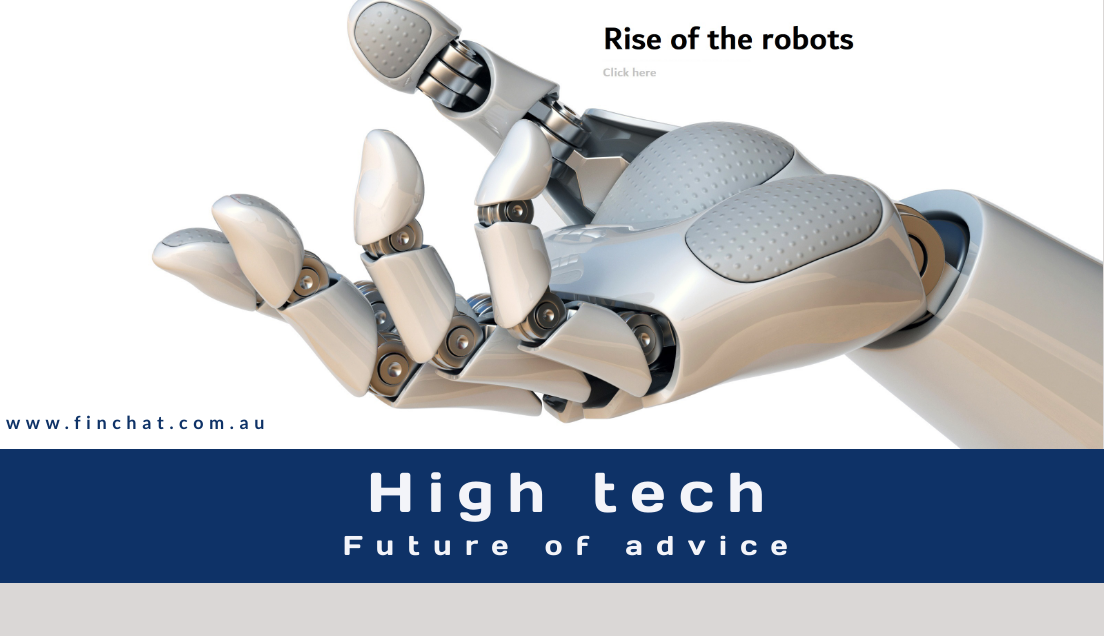Rise of the robots
The real future of financial advice – Rise of the Robots
I attended an Amazon conference where the key note speaker declared (somewhat tongue in cheek) that “in the future all companies will be IT companies”. He pointed to Uber and Airbnb who are not much more than a computer program and the market capitalization of Facebook, Amazon, Netflix, Google, Microsoft, Apple and Nvidia (called FANGMAN for short) which totalled over $7 trillion in 2019. This is more than the GDP of Germany, Italy and Indonesia Combined.
| “In the future all companies will be IT companies” |
“In the future all companies will be IT companies”
“People businesses”
People are slow and expensive. The current financial advice model is a slow and expensive “people business”. It can take weeks before your financial plan is ready and costs are substantial.

| “In the future all companies will be IT companies”. |
According to Adviser Ratings, the median fee charged for a plan in 2020 was $3,256 up from $2,510 in 2018.
Investment, implementation and ongoing fees would usually be additional costs.
This plan is created by financial planning software accessible only through an adviser. The future will be more democratic.
“People” businesses will face increasing competition from algorithms that can sort, calculate, search, rank, execute, evaluate and display massive amounts of data instantly at very low cost. So where does an adviser add value?
Holistic advice
Advisers offer holistic advice while most Robo advisers focus entirely on investment. Robo advisers usually establish a client’s investment risk profile and based on this, place the investment in a portfolio of relatively inexpensive passive funds avoiding an (expensive) active manager. A Robo adviser’s major “value add” is to save investment costs. Neither active nor passive managers guarantee returns so these are hard to compare.
A $50,000 investment returning 7% p.a. for 35 years will grow to $325,691 with an “active manager” fee of 1.5%. Using a Robo adviser with a fee of 0.5% the balance will be $455,240. A 40% improvement.
Robo advisers generally ignore budgeting, retirement planning, risk insurance and estate planning. Financial advisers address these issues, looking at all aspects of financial planning.
Will Robots move into holistic advice?
Probably. Most banks already have an app that provides very good information on your spending habits along with tips to budget. Robo advisers like Stockspot and Raiz recommend and implement investments. The MyProsperity phone app addresses most financial planning areas and Frollo combines, aggregates and updates all your bank accounts allowing you to set goals. Online life insurance comparison sites like Canstar have been around for a long time.
Finchat has an Amazon Alexa skill that does an entirely “voice based” financial health check. Users can check their current financial health on an Alexa device (or mobile phone) while preparing dinner. Effortless, painless and inexpensive.
Trust
Clients usually value their relationship with their financial adviser and usually end up financially better off with an adviser but relatively few people use one.
| According to research house Adviser Ratings, only 12.2 per cent of the population used an adviser in 2019, down from the year before. |
At the heart of the relationship is trust crafted by the adviser using “people” skills and industry expertise. According to the Hayne commission these skills were too often used to get a client to buy their master’s product rather than the “best” product for that client. The industry put profit before people and trust in the financial planning industry was damaged. It is now weighed down by compliance obligations adding costs to running a financial planning business.
Can investors trust a Robo adviser?
A report from Oracle reveals that the majority of 9,000 respondents believed consumers trust machines more than human advisers to help manage their personal finances.
| Eighty-two per cent of respondents predicted that robots will replace financial advisers by 2026. |
A recent Harvard Business School study showed that most people trust an algorithm more than they do the judgement of their fellow humans. The 2020 Robo-advice Report, Investment Trends found that globally, Robo-investing is the fastest growing area of wealth management. A study from Deloitte predicts Robo investing will grow to $16 trillion of assets under management by 2025.
Demographics
Investing with Robo advice is particularly popular with the younger generation. Two-thirds of investors who sign up for Vanguard’s Digital Advisor are either millennials or Gen Z. The average client is 37 years old. Local Robo adviser Stockspot has a similar experience. They looked at 7 years of diverse clients and found only 17% were 50 years of age or older and only 12% had more than 10 years investment experience.
This generation will be the recipients of the greatest transfer of wealth in the history of mankind when their Boomer parents leave this mortal coil. They take advice from YouTube videos like “Mad Money” and “BitBoy”, TikTok “influencers” known as FinTok and chatrooms like the Gamestop chatroom that brought a hedge fund to its knees. Financial advisers are not the gatekeepers here. This horse has bolted.
Conclusion
Will all companies in the future be IT companies? Probably not but if I were a financial advice business, I would embrace new technology and even have an “Intellectual Property” item in my balance sheet that I grew by creating or buying Fintech.




